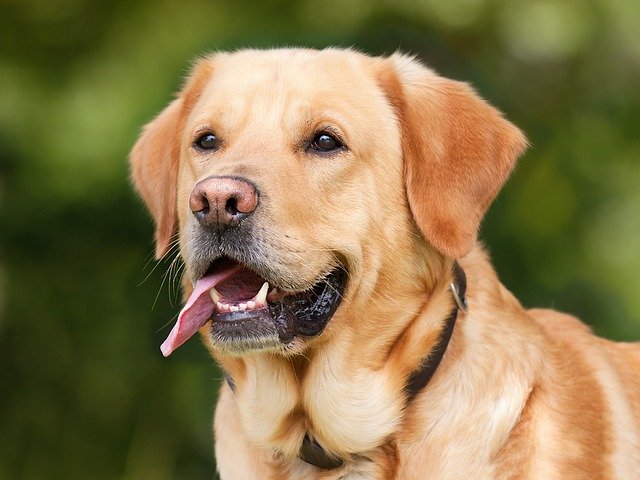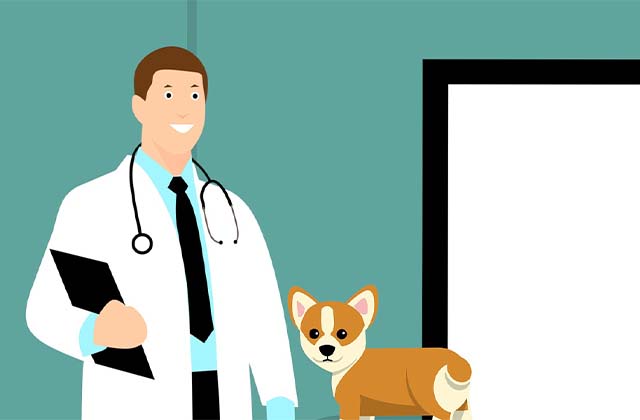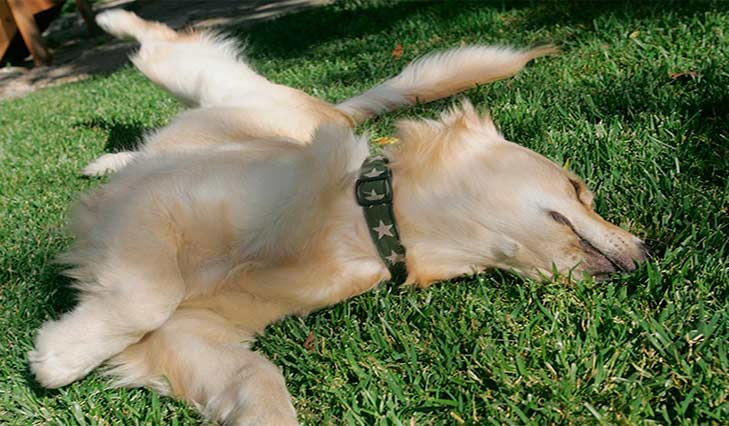
Why Is My Dog Growling At Nothing? Top 13 Reasons
First, why is my dog growling at nothing?
In most cases, a dog growling at nothing is simply caused by its extra sensitive senses, whether it be its eyes, ears, or nose. Other times, a dog growling incessantly may be an indication of more serious problems, such as malnutrition and ill health.
Please continue reading as I provide more information about why my dog is growling at nothing.
Table of Contents
Why Does My Dog Growl At Nothing?
First and foremost, it’s critical to realize that this is a behavior that dogs frequently exhibit and is, most likely, unrelated to anything serious. Dogs can communicate by barking, howling, and now growling. Dogs can occasionally express a variety of emotions, such as fear, anxiety, warning, and contentment by growling as opposed to barking or howling.
Growling occasionally might be a sign of a dog’s health problems, so this should not be disregarded. In order to rule out any serious problems, it is always preferable to understand why a behavior is taking place in the first place. Here are a few explanations for why your dog might frequently growl at nothing.
Something Or Someone Frustrates Them
Dogs don’t just whine when something annoys them. They’ll start growling shortly if it becomes too intrusive.
The growls are typically low-pitched and brief. For instance, if they reach under the table for something.
Because they are unable to obtain what is beneath, they will grunt in a frustrated manner.
But it isn’t always focused on things. Sometimes, the way you act can irritate them as well. Other actions they’ll take when you’re the source of their annoyance include the following:
- Avoid you.
- Stare excessively.
- On your belongings, pee.
- Hide under your bed.
- At you, they scratch their paws.
- Be less affectionate with you.
- gnaw on your favorite possessions, such as shoes and pajamas.
You should still remain vigilant even though it isn’t alarming enough. Urinating on objects can occasionally be a sign that trauma is beginning to set in.
Things that pee on them are under threat. As a result of being unable to contain their fear, they urinate.
This might be a sign that you’re unintentionally causing them emotional pain.
Something Makes Them Fearful
When in danger, a dog’s first reaction is to growl loudly. It’s a sign that they’re about to launch an attack. Your dog senses something is frightened when they suddenly growl at nothing.
Typically, fearful dogs will sit and growl in silence. Research suggests that when dogs obey commands, they sit. They believed that if they remained still, the frightening thing would disappear.
This frequently happens whenever loud thunder or obnoxious sirens appear. When dogs first hear these noises, they might become fearful.
They react by growling to notify their owner. indicating they want it removed while sitting.
Canine Dementia Or Cognitive Disabilities
Your dog may develop certain illnesses and medical conditions as they age if they are an older dog. The early stages of canine dementia may be indicated if your dog is growling and gazing at the wall. Like people, dogs’ minds can start to deteriorate as they age.
When a dog begins to growl, make sure to look for additional symptoms as well. Cognitive disabilities can manifest in a variety of ways.
Lethargy, shaking, trouble opening doors, excessive pacing, and antisocial behavior are the most typical symptoms of canine dementia. It would be wise to take your dog to the vet for a checkup if they exhibit any of these signs in addition to the growling.
Bad Eyesight
The eyesight in your dog could deteriorate as they age. A pet with poor vision may have trouble seeing objects clearly and may interpret shadows as potential threats. They begin growling to defend themselves as a result because they believe they are in danger.
Another Animal
Dogs can smell nearby animals much earlier than you can because they have keen senses of smell and excellent hearing. They start growling as soon as they perceive other animals as intruders.
As an illustration, even if you cannot see anything, your dog will start growling if there is a mouse in the wall. Dog growling can occasionally seem odd behavior because of this.
Smells Something You Can’t
We can’t even begin to compare our sense of smell to that of your dog. Dogs have adapted to smell more than almost anything else.
Let’s begin with their nose. In the noses of people, there are about 6 million olfactory receptors. It is common among most animals, despite sounding large when spoken. Although not particularly good at it, dogs are far superior to humans in this regard.
Due to their 300 million olfactory receptors, they are more sensitive to smells in their environment.
In addition, they possess a skill that most people lack—the capacity to independently move their nostrils. When you combine that with where their nose is on their face, they have a keen sense of which side of their nose a smell is coming from.
Their noses were designed specifically for smelling. We inhale air into our lungs in the same manner that people do when they breathe in through their noses. Nothing prevents us from inhaling through our nose and immediately transferring everything we smelled to our lungs.
When a dog breathes through their nose, a physical flap folds over to stop the air from entering their respiratory system right away. In doing so, they are able to hold the scent in their nose and linger over it like a sophisticated person savoring a glass of wine.
All of those smells are eventually recognized by their special brain, which devotes about 40 times as much brainpower to smell as a human brain does.
All of this adds up to make the world of smells you live in a dull, black-and-white version of the vibrant, colorful “Munchkinland” of smells that your dog inhabits.
A dog may be able to detect the scent of a single drop of liquid dropped in water the size of 20 swimming pools, according to some theories.
Given their superior sense of smell compared to ours, if your dog appears to be growling at nothing, you should take a closer look to see if they might be reacting to something outside of their immediate environment.
Hears Something You Don’t
In the same way that a dog’s nose is superior to all other animal senses, so are their ears.
You can probably tell that dogs hear better than us just by looking at their ears. Because of their size compared to a person’s ears, which are comparably very small, ears, particularly those of dogs, can pick up more sound.
Strong muscles in their ears give these creatures more control over their ears than humans do. They can lay them flat against their head or raise them up. In addition, they have the ability to move them independently, enabling them to aim them like a satellite to precisely locate the source of a specific sound.
As a result, it is clear once more that they are more adept at absorbing sounds and odors from their surroundings. And, like her sense of smell, once they have taken in environmental influences, their special brains interpret the input in a different way than human brains do.
Dogs can hear frequencies that people cannot, specifically higher frequencies. Beyond 20 vibrations per second (20,000Hz), sounds are inaudible to humans. If we could hear it, it would sound like a scream that could shatter glass and have an extremely high pitch.
Dogs, on the other hand, are able to hear a wider range of sounds than humans because they can detect sounds that vibrate at up to 50,000 hertz (50,000Hz). Dog whistles work because of our physical differences; they are undetectable to us but audible and clear to them.
These higher frequency sounds can also be heard from a greater distance. For this reason, piercing screams are more audible at a distance than low hollers and bass noises.
Dogs are therefore better able to hear distant sounds than humans.
Therefore, if your dog is barking at “nothing,” remember that it’s possible that they can hear something that you and I would be unable to hear at all.
Sees Something You Can’t
The vision of dogs is very dissimilar from that of humans. This subject’s science quickly becomes complex.
In other words, under the right conditions, humans have the potential to see “better” than dogs during the day. Dogs cannot see in color, whereas humans and other mammals have a higher density of cones in our eyes. And, in practice, our height usually gives us a benefit when looking for something outside. However, dogs have better motion perception than people do, which enables them to track predators and prey that are moving quickly more effectively.
The odds quickly shift in the dogs’ favor once the lights go out, though. Much larger pupils than those of humans are found in dogs, cats, and many other predators.
In low-light conditions, such as the dark, this enables them to absorb more light than humans can.
Their tapetum lucidum is another distinct advantage they possess. It’s a fancy word, but you’ve undoubtedly heard of this particular anatomical feature found in dogs and cats.
This anatomical characteristic functions as a mirror within the dog’s eye, reflecting light back out of the eye, against the pupil, and giving the pupil a second opportunity to look at the scene.
Because of this, when a light is shone on dogs and cats at night, their eyes will glow. In the manner of a flashlight, the tapetum lucidum is reflecting light back out of their eyes. See more about Why Do Dogs Blow Out Their Nose?
Feels Something That We Can’t
I’ll use the term “pressure” to speak generally about its two interpretations.”
First, pressure, which refers to the variations in barometric pressure and the static electromagnetic fields that occur before storms.
The precise mechanism by which dogs can foretell approaching storms is still a mystery to scientists. We are aware that variations in atmospheric pressure prior to storms alter wind patterns, which in turn cause your dog to smell various scents.
Because of their ability to detect smell, your dog can tell when something in their environment is changing at the very least.
Dogs, however, have also demonstrated a remarkable sensitivity to changes in magnetic fields, which frequently accompany thunderstorms.
Consequently, when there is an electrical storm, a lot of dogs will seek refuge in the bathroom. The metal pipes that go into the ground are thought to act as grounding devices, dissipating the electricity in that part of your home, though we can’t be sure of that. Additionally, porcelain, which is frequently found in bathrooms, diffuses electricity.
Again, your dog is capable of detecting all of these things without you even being aware that anything has changed.
The second possibility is that your dog is under pressure from the household’s social pressure.
Dogs are very perceptive of their family members’ emotional states and constantly respond to them, even when their owners are unaware of it.
They might pick up on your cues, even if you aren’t putting anything out there. They might also be reacting by growling because they sense your stress, anxiety, or other negative emotions.
Could Be In Pain
If there is no external cause for your dog’s growling, it is most likely an internal one. Considering taking them to your veterinarian is a good idea because they might be in pain or uncomfortable. It’s unlikely that you will growl for no reason at all.
The growling you observe in your dog when they are in pain will be different from the growling they make in response to odors, sounds, or sights.
Your dog will likely be either completely unfocused and gazing blankly ahead or holding its head still and moving its eyes around in an effort to catch your attention.
The growling will likely be extremely low and prolonged, and it may be accompanied by additional symptoms like the ones listed below:
- Unusual aggressive behavior
- Other vocalizations like yelping or snarling
- Lots of licking, either their paws or just in the air
- Stiffness and lethargy
- Changes in eating and drinking habits
- Trembling or shaking
- Fever
- Dry or wet nose and eyes
One time when my dog slipped a disc, she stood motionless, holding her head straight and moving her eyes but not her head while emitting a low, agonizing growling sound. It wasn’t, but your dog might be growling as a result of a comparable internal wound.
It would be impossible to list all the potential issues with your dog in a few words. Veterinarians undergo extensive training for a reason, after all.
It is critical to seek veterinary care right away if your dog is growling while displaying any of the other warning signs listed above or if they growl repeatedly and inconclusively.
Only your veterinarian will be able to accurately determine whether your dog is in pain or whether something else is going on inside your poor puppy that is making them growl.
It’s critical to understand that this growling without a clear source could indicate that your dog has a physical issue and isn’t just acting in an odd or amusing way.
Just to be clear, your dog won’t growl at nothing. When your dog growls at “nothing,” even if they do not appear to be in pain, it is possible that they are experiencing some other psychological or neurological problem. You should have your dog’s veterinarian check this out. It’s not just nothing, either.
May Be Protecting Their Turf
Dogs enjoy routine, a sense of security, and comfort, which includes having the assurance that the things they perceive as being theirs will remain safe and secure.
While some dogs are more possessive of their belongings, toys, beds, food, and people than others are, most dogs will at some point in their lives feel possessive or act in a possessive or territorial manner toward something.
When a dog is trying to growl you or another dog away from a toy or its food, it’s usually fairly obvious, and you probably won’t fall for this type of growling thinking it’s growling at nothing.
Nevertheless, it’s crucial to be aware that your dog might only growl when they are standing over their bed or at a specific spot on the couch, and you might not have noticed it.
Or it could be that they are growling to scare off anyone they sense is outside.
Canine Dementia
Our canine friends can develop age-related dementia, though it may sometimes be less obvious in them. Incontinence, confusion, more barking or growling are just a few of the symptoms of canine dementia.
Because dogs suffering from dementia may think they’re hearing (or even seeing) things that aren’t there this is the rare case where dogs may really be growling at nothing. Well, you’re dog thinks they’re growling at something but sadly there isn’t anything there.
Growling Before Bed When Tired
Around bedtime or other times when they are extremely tired, some dogs become irritable. Just as a tired child can become agitated, so too can a tired dog become grumpy, more likely to growl, and more possessive of their bodies and belongings, like toys and bones.

How To Understand Your Dog’s Growling At Nothing.
It’s critical to identify the trigger for your dog’s behavior if it’s growling at nothing. As we already learned, a dog’s growling at nothing may be caused by a dietary problem, an ailment, or a sickness. In order to control the growling, the underlying cause must be addressed.
When Did The Behavior Start?
When did the behavior start? That is the first thing you need to ask yourself if you want to know why your dog is growling at nothing. There may be a reason for the behavior, such as illness, injury, or dietary concerns, if it occurs frequently and suddenly started happening overnight.
In contrast, if your dog only occasionally growls at nothing, it may simply be because it senses something you don’t. If the growling does not appear to be directed at another visible person or animal, there is no need to be concerned.
If your dog has consistently growled in response to nothing, it is either acting aggressively or you may have unintentionally rewarded the behavior.
What Time Does Your Dog Now Do It?
You must note when your dog currently exhibits the behavior in addition to asking when it first appeared. Again, your dog’s extra-sensitive senses could be the cause of any seemingly random growling. However, if your dog consistently growls at nothing during thunderstorms, whenever a police siren sounds, or in response to other predictable events, fear may be to blame.
Determining whether you have unintentionally rewarded your dog’s growling requires paying close attention to those instances. Inadvertent praise is probably to blame if your dog growls whenever it requests attention, treats, or toys.
Last but not least, if your dog is constantly growling at nothing, it may be suffering from an illness or injury. The same holds true if it’s hostile.
What Should You Do If Your Dog Is Growling?
You can take action once you’ve identified the root of your dog’s growling. The root cause of your dog’s growling must be addressed specifically in your plan. In other words, if a diet-related problem is at the root of the behavior, you can’t expect distraction to stop the growling.
Remove The Issue
It’s best to eliminate the problem as much as you can if fear or another known event is making your dog growl at nothing. As an illustration, a toy might make your dog fearful and growl at what appears to be nothing. To end the growling, take away the toy.
Distract Your Dog
In some circumstances, like a thunderstorm, you won’t be able to completely resolve the problem. Find a way to divert your dog in these circumstances. With its favorite toy, treats, and affection, you might be able to divert your dog.
If you believe the dog is afraid of something you are powerless to stop, it is crucial to bring the dog close to you. Dogs frequently regard their owners as their protectors. Your dog will likely feel much more comfortable if you keep them close by, which will reduce their growling.
Don’t Reward The Behavior
If you believe that you unintentionally rewarded your dog’s growling, stop it right away. If you praise your dog when it growls, the behavior will likely continue and possibly get worse. Try teaching your dog alternative ways to communicate its needs.
Talk To Your Vet
If you are still unable to identify the root of your dog’s persistent growling, consult your veterinarian. The dog can be examined by your veterinarian to determine whether diet, illness, sickness, or old age are to blame. To assist in your pet’s return to health, adhere to the veterinarian’s recommendations.
Why Is My Dog Barking At “nothing”?
When your dog barks, it’s likely that it’s trying to express its feelings more abrasively, either to you or the object it’s barking at. When a dog barks at “nothing,” they are likely anticipating a response from you or from themselves and are responding to an outside factor.
Barking is louder than growling. It is a form of communication as well, but it does so to a more immediate audience than barking.
The dog is acting less actively. Even if a dog doesn’t anticipate things getting worse, it may still growl. Because it enables the dog to stay small and passive in whatever circumstance it finds itself in, it is frequently a sign of fear or pain.
On the other hand, barking is audible and lets people in a larger area know how the dog is feeling. It is attempting to draw notice, entice more animals to join the pack, or frighten the intruder away.
It causes the dog to bark loudly and calls for both the physical capacity to do so and the courage to pursue the matter further.
Again, if your dog is barking ineffectively, it is not because it is engaging in ineffective behavior but rather because you cannot see what it is engaging in.
If the cause of your dog’s growling worsens or persists, they may start growling first before switching to barking.
Your dog wants that outside factor to leave the situation, so they’re escalating the situation to make sure it knows it’s there, finds it frightening, and wants it gone.
Final Words
In order to address the problem safely and quickly, it’s critical to identify the underlying condition’s cause. Never let a dog growl nonstop as this can result in attacks and other dangerous situations. It’s crucial to speak with your veterinarian if you feel unsafe around your dog in order to find out the best way to ethically and safely place your dog in a new home.
The main topic of the post was why my dog is growling at nothing. Have you gained a deeper understanding of dog growling at nothing now that you’ve read the entire post?
Once more, please check out our posts if you want to learn more about dogs. Please leave a comment if you have any queries regarding why your dog is growling in the absence of anything.
We appreciate your reading.




